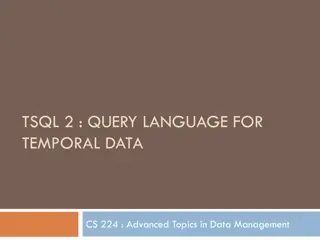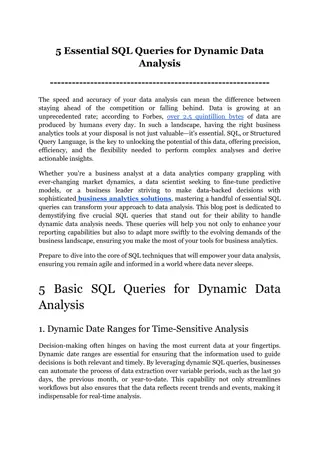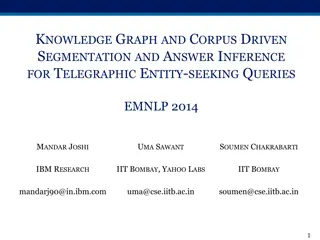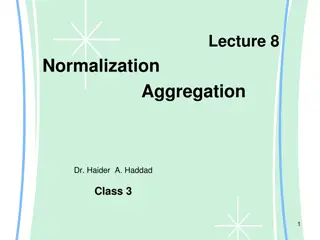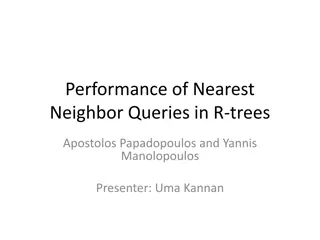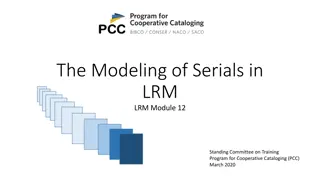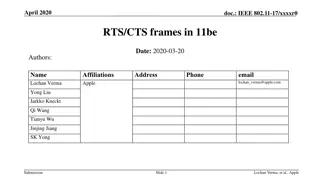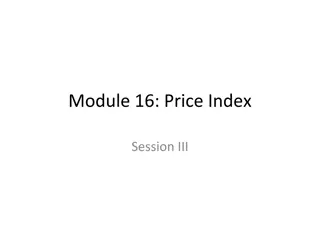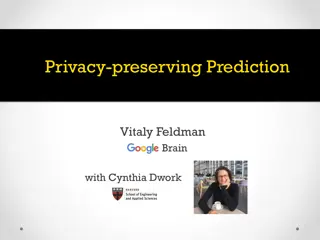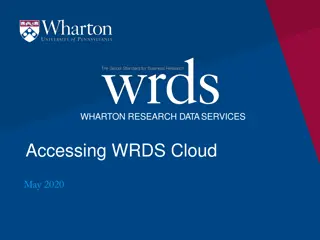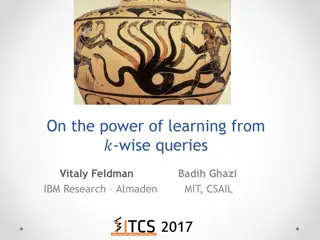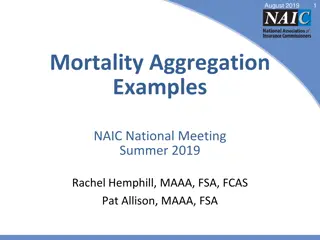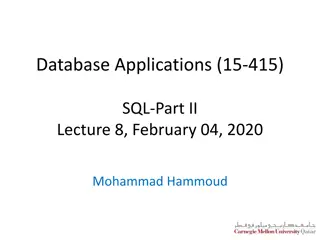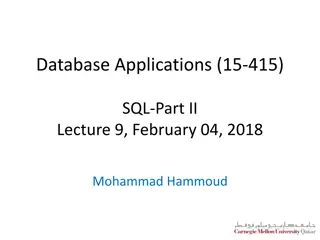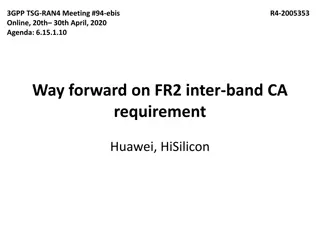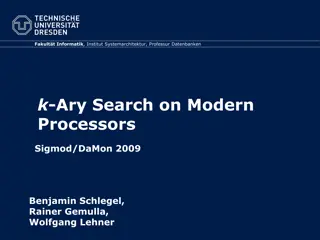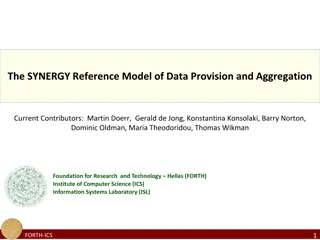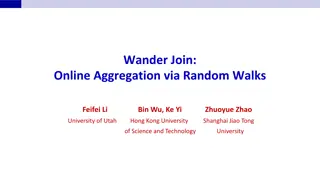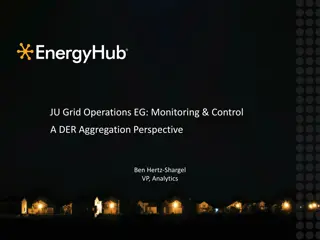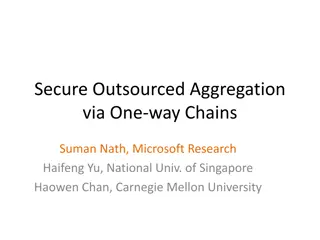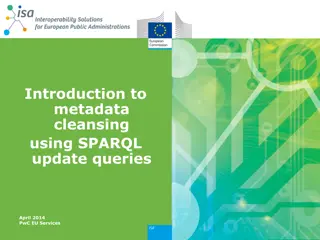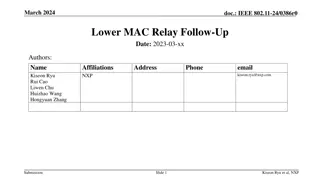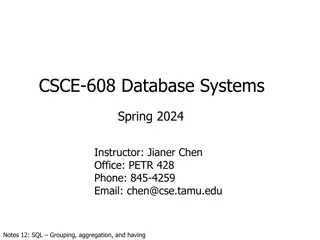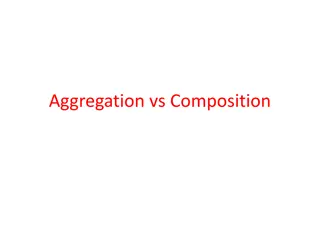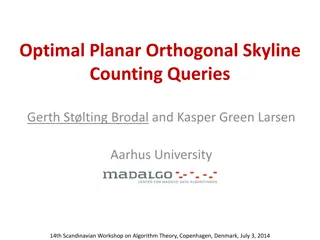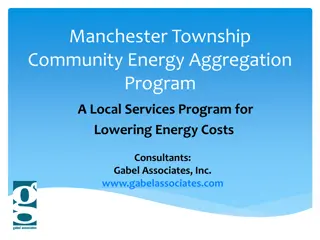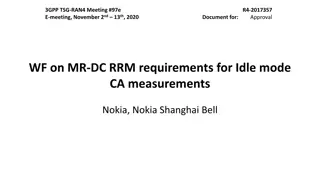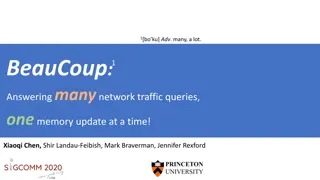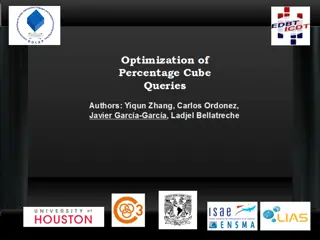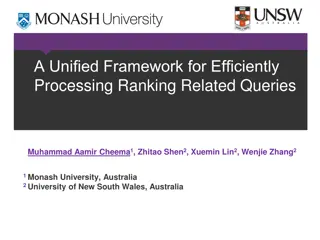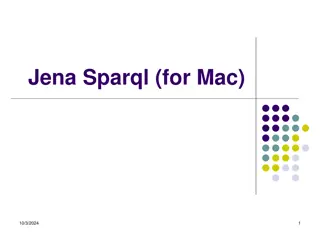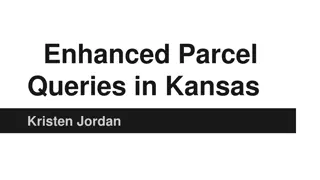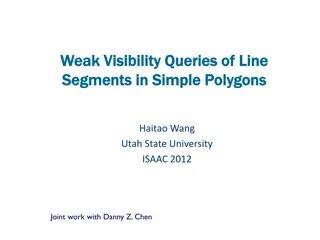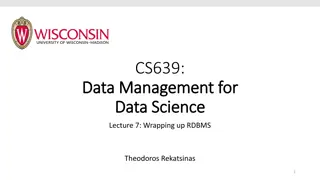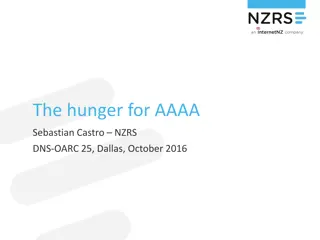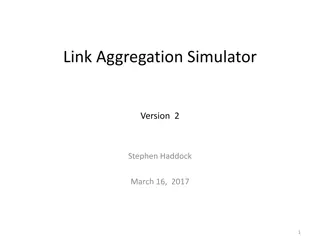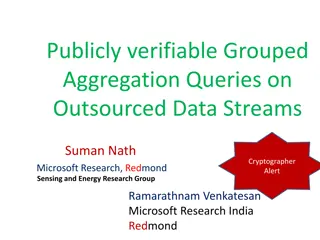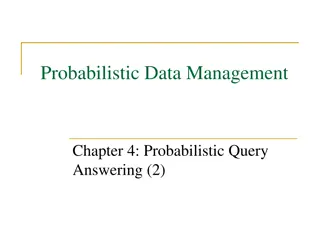ARGOS Inventory by Fund Queries Presentation Slides
The presentation slides showcase the ARGOS Inventory by Fund Queries project, featuring detailed information and visuals to help understand the queries and data analysis process. The slides provide insights into inventory management methods based on different funds, highlighting key aspects of the A
1 views • 14 slides
Understanding Temporal Data Management in TSQL Queries
Explore the realm of temporal data in TSQL queries, delving into the concepts of valid time and transaction time, different types of relations like snapshot and bi-temporal, and the significance of time dimensions in database management. Learn how temporal databases support time-related queries for
6 views • 41 slides
5 Essential SQL Queries for Dynamic Data Analysis
Explore the transformative power of SQL with our latest guide, which highlights five critical SQL queries essential for dynamic data analysis. This post covers how these queries can be utilized by business analytics tools to enable data analysts, scientists, and BI professionals to extract actionabl
6 views • 8 slides
Knowledge Graph and Corpus Driven Segmentation for Entity-Seeking Queries
This study discusses the challenges in processing entity-seeking queries, the importance of corpus in complementing knowledge graphs, and the methodology of segmentation for accurate answer inference. The research aims to bridge the gap between structured knowledge graphs and unstructured queries li
0 views • 24 slides
Database Normalization and Aggregation Concepts
Understanding the advantages and disadvantages of database normalization, the concept of aggregation in the ER model, and examples of creating ER diagrams using aggregation rules with related entities. Explore the benefits of smaller databases and better performance through normalization, and how ag
4 views • 11 slides
Performance of Nearest Neighbor Queries in R-trees
Spatial data management research focuses on designing robust spatial data structures, inventing new models, constructing query languages, and optimizing query processing. This study explores the estimation of query performance and selectivity, specifically in R-trees, for efficient access planning.
1 views • 32 slides
Modeling of Serials in IFLA LRM Module 12 by PCC
Serials in library cataloging are modeled as complex constructs in IFLA LRM with considerations for whole/part and aggregation relationships. This module explores the intricacies of serial manifestations, issue manifestations, and the concept of WEM lock, providing insights into collocating closely-
0 views • 15 slides
Implications of Large-size RU Aggregation on RTS/CTS in IEEE 802.11-17
Addressing implications of large-size RU aggregation on RTS/CTS in IEEE 802.11-17, focusing on the signaling of Enhanced High Throughput Format PPDU Bandwidth and puncturing in RTS/CTS frames. Proposing the use of HE MU-RTS Trigger frame to elicit CTS response from STAs, along with different CTS for
4 views • 17 slides
Understanding Price Index Formulas and Aggregation Methods
Exploring the significance of price index formulas and aggregation methods in economic analysis. Learn about simple and weighted aggregate indices, elementary index calculations, and why aggregation methods are essential for computing price changes accurately.
0 views • 30 slides
Privacy-Preserving Prediction and Learning in Machine Learning Research
Explore the concepts of privacy-preserving prediction and learning in machine learning research, including differential privacy, trade-offs, prediction APIs, membership inference attacks, label aggregation, classification via aggregation, and prediction stability. The content delves into the challen
0 views • 11 slides
Understanding the Differences Between Web Queries and WRDS-Cloud Queries
Explore the distinctions between web queries and WRDS-Cloud queries, such as the tools used, query limitations, and knowledge requirements. Learn how to access support for WRDS Cloud and enhance your data research skills.
0 views • 5 slides
Exploring the Power of Wise Queries in Statistical Learning
Dive into the world of statistical learning with a focus on the impact of wise queries. Discover how statistical problems are approached, the significance of statistical queries, and the comparisons between wise and unary queries. Explore the implications for PAC learning and uncover key insights in
0 views • 8 slides
Mortality Aggregation Examples at NAIC National Meeting
In August 2019, key concepts for mortality aggregation were discussed at the NAIC National Meeting. The examples presented covered approaches under VM-20 language, emphasizing the importance of informed mortality segment assumptions through credible aggregation methods.
0 views • 21 slides
Exploring SQL Queries and Joins in Database Applications Lecture
Discover a comprehensive overview of SQL queries, including nested and deeply nested queries, in the context of database applications. Learn about joining tables, finding sailors who reserved specific boats, handling NULL values, and more in this informative lecture featuring examples and explanatio
0 views • 53 slides
SQL Part II Lecture Summary: Nested Queries, Joins, and Updates for Database Applications
In this SQL lecture, Mohammad Hammoud covers nested queries, insertion, deletion, updates, handling NULL values, join variants, and advanced query techniques. Examples include finding sailors who have reserved specific boats, using nested queries to filter data, and deep nested queries for complex d
0 views • 53 slides
Agreements on FR2 Inter-Band Carrier Aggregation Requirements
Agreements have been reached on the RRM requirements and scaling factors for FR2 inter-band Carrier Aggregation, focusing on common beam and independent beam management. Discussions include alignment with Release 16 specifications, scenarios, and RF architectures. Interruption requirements for diffe
0 views • 8 slides
k-Ary Search on Modern Processors
The presentation discusses the importance of searching operations in computer science, focusing on different types of searches such as point queries, nearest-neighbor key queries, and range queries. It explores search algorithms including linear search, hash-based search, tree-based search, and sort
0 views • 18 slides
SYNERGY Reference Model for Data Provision and Aggregation
The SYNERGY Reference Model, developed by a team of respected contributors, outlines strategies for effective data provision and aggregation. Led by renowned experts from FORTH, the model offers valuable insights for enhancing research practices and data management processes.
0 views • 81 slides
Wander Join: Online Aggregation via Random Walks in Database Workloads
Wander Join is a technique for online aggregation using random walks, addressing challenges in efficiency and correctness in both transactional and analytical database workloads. It allows for complex analytical queries such as TPC-H queries and provides insights into revenue loss due to returned or
0 views • 27 slides
DER Aggregation in Monitoring and Control Operations
In the realm of energy grid operations, DER aggregation plays a crucial role from both short and long-term perspectives, focusing on transactive energy and autonomous devices. Communication and coordination are key for successful monitoring and control, with a need for a common framework supporting
0 views • 12 slides
Secure Outsourced Aggregation via One-way Chains - Research Overview
Exploring secure outsourced aggregation techniques using one-way chains for wide-area shared sensing and weather monitoring. The unique characteristics, challenges, and solutions for dealing with malicious aggregators are discussed. The research presents the contributions and advancements in optimiz
0 views • 30 slides
Metadata Cleansing Using SPARQL Update Queries
Learn how to transform and cleanse RDF metadata using SPARQL Update queries to conform to the ADMS-AP for Joinup. This tutorial provides essential knowledge on converting metadata for interoperability solutions and the main queries involved. Discover how to ensure your metadata is compliant and read
0 views • 37 slides
IEEE 802.11-24/0386r0 Lower MAC Relay Protocol Details
Detailed discussion on supporting the relay protocol in IEEE 802.11bn, covering relay addressing, end-to-end BA, relay TXOP protection, beacon forwarding, security processing, non-UHR STA support, sounding procedure, A-MPDU aggregation, de-aggregation, and more. The relay operation involves relay de
0 views • 16 slides
Understanding SQL Aggregation and Grouping in Database Systems
SQL offers powerful aggregation functions like SUM, AVG, COUNT, MIN, and MAX to perform calculations on column data efficiently. By utilizing DISTINCT and GROUP BY clauses, you can manipulate and organize your data effectively in database systems while handling NULL values appropriately.
0 views • 54 slides
Understanding the Difference Between Aggregation and Composition in Object-Oriented Programming
Aggregation and Composition are two important concepts in object-oriented programming. Aggregation refers to a 'has-a' relationship where the contained object can survive independently, while Composition indicates that the member object is part of the containing class and cannot exist separately. Th
0 views • 15 slides
Advanced Techniques for Orthogonal Skyline Counting Queries
Advanced techniques for orthogonal skyline counting queries discuss optimal planar solutions, dividing and conquering for topmost point identification, efficient vertical slab counting, succinct data structures for prefix sums and range maxima, upper bounds on degree and multi-slab queries, as well
0 views • 11 slides
Manchester Township Community Energy Aggregation Program Overview
The Manchester Township Community Energy Aggregation Program, implemented under GEA and BPU rules, allows residents to pool together for better energy prices. The program involves a competitive bid process, with the contract awarded to TriEagle Energy. Residents benefit from reduced energy costs, co
0 views • 14 slides
3GPP TSG-RAN4 Meeting #97e Summary
During the 3GPP TSG-RAN4 Meeting #97e, discussions on Multi-RAT Dual Connectivity and Carrier Aggregation enhancements were held. A Work Item (WF) focusing on Idle mode Carrier Aggregation (CA) measurement Radio Resource Management (RRM) requirements was addressed. The meeting included topics such a
0 views • 17 slides
Constructing Price Index: General Procedure and Aggregation
The process of constructing a price index involves various steps such as computation of price relatives, aggregation at different levels, selection of base period, and designing data collection methods. Weighted arithmetic mean and simple ratio calculations are used in aggregating price indices. A t
0 views • 31 slides
Efficient Network Traffic Queries Handling Strategies
Solve network traffic queries efficiently by ensuring constant memory updates and minimal memory access. Implement strategies such as managing multiple data structures for various query types and coordinating queries to optimize packet processing. Explore the coupon collector problem to enhance quer
0 views • 26 slides
Optimizing Queries and Constructing Percentage Cube in Business Intelligence
Presented at ENSMA, this paper introduces optimized strategies for constructing a percentage cube to enhance processing of complex queries in modern business intelligence. It discusses challenges, comparison between percentage queries and percentage cube, and showcases a data cube analysis of car sa
0 views • 21 slides
Unified Framework for Efficient Ranking-Related Queries Processing
The research paper discusses a unified framework focusing on efficiently processing ranking-related queries. It covers dual mapping and ranking, k-lower envelope usage in ranking, top-k queries solutions, and applications like identifying user preferences. The study showcases algorithms, experimenta
0 views • 22 slides
Understanding Jena SPARQL for Mac and RDF Queries
Jena SPARQL for Mac is a powerful tool for querying RDF graphs using SPARQL. Learn about RDF graphs, models, triples, and how SPARQL queries work. Explore ARQ, a query engine that supports the SPARQL RDF Query language and features multiple query languages. Discover how to install ARQ and execute SP
0 views • 25 slides
Enhanced Parcel Queries in Kansas by Kristen Jordan
Project aims to provide expanded tools and services for statewide parcel queries in Kansas. Background includes the Kansas Data Access and Support Center's existing project and the implementation of a REST web service. Specific goals involve accessing services through desktop and web applications, p
0 views • 20 slides
Weak Visibility Queries of Line Segments in Simple Polygons - Overview
This information discusses weak visibility queries of line segments in simple polygons, focusing on topics such as visibility of line segments, visibility polygons, visibility graphs, and related previous work on preprocessing and data structures for visibility queries in simple polygons.
0 views • 26 slides
SQL Aggregation and Group By: Understanding Concepts and Examples
Exploring SQL aggregation operations such as AVG, COUNT, and more, along with the GROUP BY clause for grouping data based on specific attributes. Examples illustrate how to use these features effectively in SQL queries to retrieve meaningful insights from databases.
0 views • 44 slides
Investigating Anomalous DNS Queries: A Case Study from DNS-OARC 25, Dallas
The exploration uncovers a surge in AAAA queries, leading to a 20% spike in billing. Through meticulous analysis, patterns emerged showing excessive AAAA queries for specific nameservers lacking AAAA glue. Remedies included reaching out to providers and deploying temporary fixes. The resolution invo
0 views • 13 slides
Overview of Link Aggregation Simulator
This presentation provides an overview of a Link Aggregation Simulator designed to demonstrate and test LACP and DRCP operation. It guides users through creating devices, adding components, including link aggregation, and scheduling events. The simulator allows for testing of network components and
0 views • 20 slides
Publicly Verifiable Grouped Aggregation Queries on Outsourced Data Streams
Explore the challenges and solutions for publicly verifiable grouped aggregation queries on outsourced data streams, focusing on security, verification, and cloud computing. The research discusses how to handle large amounts of data using small memory components and emphasizes the importance of data
0 views • 34 slides
Understanding Probabilistic Query Answering and Group Nearest Neighbor Queries
This chapter delves into probabilistic query types, focusing on probabilistic group nearest neighbor queries. Explore the definitions, processing techniques, and applications of such queries. Learn how probabilistic data management plays a crucial role in uncertain databases, spatial queries, and mo
0 views • 34 slides

